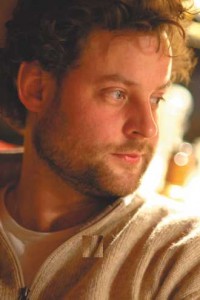
Chris Turner is the author of the national bestseller The Geography of Hope: A Tour of the World We Need (Random House, 2007), which was nominated as finalist (non-fiction) for the 2008 Governor General’s Literary Award and named as one of the Globe and Mail’s Best Books of the year. Rather than lending his voice to the chorus of recriminations heard in recent environmental tracts, Turner travelled the globe in search of hope for a sustainable future and now points to the bright light at the end of the very dark tunnel. On Thursday Feb. 5, Turner delivered the McGill School of Environment Annual Environment Public Lecture at New Residence Hall. Before the event, the McGill Reporter asked him Four Burning Questions.
Q: What was the ultimate motivator that compelled you to travel the globe in search of sustainable ways of living?
A: Two things. The first was a strong sense that moving from our unsustainable path to a sustainable one was of vital necessity and could best be initiated by finding a hopeful vision of a world worth working to build. The second was the birth of my daughter, which moved this argument from the rhetorical plane to the material one for me personally. The Geography of Hope is ultimately the world she needs.
Q: Given the often very bleak portrayal of the state of our planet, how do you draw such optimistic conclusions?
A: I don’t even think of what I do as drawing conclusions. I think of it as presenting evidence. The state of our planet is indeed perilous, but the solutions are close at hand and lead to a far superior social order and way of life. Our houses can be power plants and our neighbourhoods can be walkable and our energy can be renewable. Not quite tomorrow but practically the day after, if there’s sufficient will. What’s not to be enthusiastic about?
Q: What was the most surprising thing you learned while travelling?
A: In a broad stroke, that the tools for building a sustainable way of life are so close at hand, so elegant in their design and so effective in their implementation. If I were to give a specific example, it’d be hard to beat the Solarsiedlung development in Freiburg, Germany, which is a collection of 58 middle-class townhouses that produce more energy than they consume over the course of a year. I maybe thought I’d find experimental, demonstration-project stuff of that calibre. But a fully functional, middle-class neighbourhood? Neat.
Q: While many great examples of community-oriented grassroots change in favour of sustainability exist, what’s your take on the role the government should play, particularly in Canada?
A: Government’s role, if it’s doing the job well, is to re-draw the parameters to actively encourage sustainability and actively discourage unsustainable practices and then mostly get out of the way and let entrepreneurial zeal and community spirit do the rest. The best stuff I saw in my research – Danish zero-emissions islands, German solar-industry towns et al – started with bold but simple legislation penalizing greenhouse gas emissions and rewarding renewable energy production. From there, though, it was Danish villagers and Berlin lab rats who figured out how to make this stuff happen.
Editor’s Note: Welcome to “Four Burning Questions for…” a new feature in the McGill Reporter. Each issue we will pose four questions to visiting lecturers, dignitaries, scholars or experts found here at McGill. If you know of someone of interest coming to McGill, contact neale.mcdevitt@mcgill.ca several weeks before your event.
